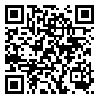Volume 5, Issue 17 (2017)
CFL 2017, 5(17): 223-245 |
Back to browse issues page
Download citation:
BibTeX | RIS | EndNote | Medlars | ProCite | Reference Manager | RefWorks
Send citation to:



BibTeX | RIS | EndNote | Medlars | ProCite | Reference Manager | RefWorks
Send citation to:
Study of Semantic Dis-normalization in Lalaei Irani and Alah Tajiky due to Linch's Theory. CFL 2017; 5 (17) :223-245
URL: http://cfl.modares.ac.ir/article-11-3603-en.html
URL: http://cfl.modares.ac.ir/article-11-3603-en.html
Abstract: (5504 Views)
Abstract
Lalaei Irani and Alah Tajiky are verses due to mother's emotions of public literature addressing children, besides it is dis-normalization that are affective methods of making outstanding, disfamilairization that is affective approach especially in poems. Such method is used by authors of Lalaei Irani and Alah Tajiky, they have them disfamilar, in order to make the audience's mind entangled in outstanding, intellectual and artistic collection of poems, making it more pleasant. This study aims to assign the methods of semantic disnormarlization in Lalaei Irani and Alah Tajiky due to descriptive-analytical method in the light of comparative literature in the form of structuralism and Linch's model of disfamiliarization. The most important meta-normalization meaning semantic disnormalization has been examined Lalaei Irani and Alah Tajiky. The selection of the present study statistical society is based on 700 frequent hemistiches from Iranian lalaeis as well as 700 frequent hemistiches from Tajiky Alahes that shows the kinds of semantic disnormalization such as; objectification, fluentification, animal-based, experience-based and plantstification in the mother's verses in which plantsification is more visible than other. The use of different disnormalization transfer the mother feeling, poetic emotion, and finally, the audience's reception becomes more effective than the audience mind especially children feel the poetic beauty and semantic emotions more.
Lalaei Irani and Alah Tajiky are verses due to mother's emotions of public literature addressing children, besides it is dis-normalization that are affective methods of making outstanding, disfamilairization that is affective approach especially in poems. Such method is used by authors of Lalaei Irani and Alah Tajiky, they have them disfamilar, in order to make the audience's mind entangled in outstanding, intellectual and artistic collection of poems, making it more pleasant. This study aims to assign the methods of semantic disnormarlization in Lalaei Irani and Alah Tajiky due to descriptive-analytical method in the light of comparative literature in the form of structuralism and Linch's model of disfamiliarization. The most important meta-normalization meaning semantic disnormalization has been examined Lalaei Irani and Alah Tajiky. The selection of the present study statistical society is based on 700 frequent hemistiches from Iranian lalaeis as well as 700 frequent hemistiches from Tajiky Alahes that shows the kinds of semantic disnormalization such as; objectification, fluentification, animal-based, experience-based and plantstification in the mother's verses in which plantsification is more visible than other. The use of different disnormalization transfer the mother feeling, poetic emotion, and finally, the audience's reception becomes more effective than the audience mind especially children feel the poetic beauty and semantic emotions more.
Keywords: Key words: Semantic Disnormalization, Geofry Linch, Lalaei Irani, Alah Tajiky, Public Literature
Article Type: Research Paper |
Subject:
Popular literature
Received: 2016/07/26 | Accepted: 2017/09/26 | Published: 2017/11/22
Received: 2016/07/26 | Accepted: 2017/09/26 | Published: 2017/11/22
| Rights and permissions | |
 |
This work is licensed under a Creative Commons Attribution-NonCommercial 4.0 International License. |






